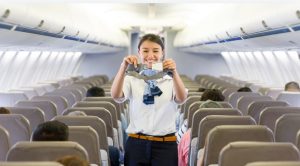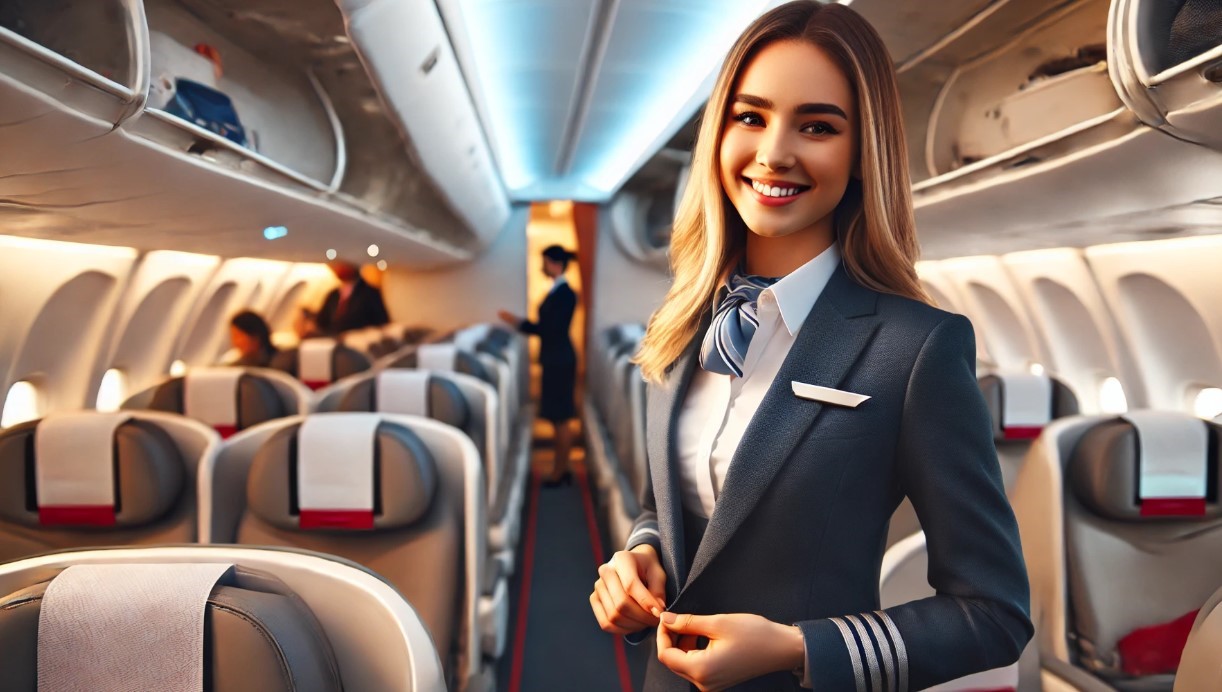Becoming a flight attendant is a dream career for many, offering the opportunity to travel the world, experience different cultures, and work in a dynamic, fast-paced environment.
But one of the most common questions for those considering this career path is: how much does a flight attendant earn annually in the UK? This role offers competitive salaries, but earnings can vary significantly depending on factors like the airline, location, experience, and whether you’re flying domestic or international routes.
In this article, we will take an in-depth look at how much flight attendants make annually, exploring key factors like hourly and monthly pay, location-based differences, and the benefits that make the job even more appealing.
Whether you’re curious about starting salaries, how much senior flight attendants earn, or how the pay differs across airlines, we’ve got you covered.
What Is the Average Salary for Flight Attendants in the UK?

The average salary for flight attendants in the UK typically falls between £18,000 and £24,000 per year, with more experienced crew members earning up to £28,000 or higher. Pay varies according to location, experience level, and airline.
Most entry-level flight attendants earn close to £18,000, while those with more experience can see their salary increase significantly.
| Experience Level | Average Annual Salary |
| Entry-Level (0-2 years) | £18,000 – £20,000 |
| Mid-Level (2-5 years) | £21,000 – £24,000 |
| Senior Level (5+ years) | £25,000 – £28,000 |
| Senior Cabin Crew/Lead Role | £30,000+ |
Salaries tend to be higher at premium airlines like British Airways and Virgin Atlantic, compared to budget carriers such as easyJet and Ryanair.
Additionally, flight attendants on international flights often earn more than those on domestic routes due to the longer hours and increased responsibilities.
How Much Do Flight Attendants Earn per Hour in the UK?

Flight attendants in the UK are typically paid hourly, and their rates range from £9 to £15 per hour, depending on their experience and the airline.
Flight attendants working for larger airlines or on international routes may receive higher hourly pay than those working for budget airlines on shorter domestic routes.
| Experience Level | Hourly Wage Range |
| Entry-Level (0-2 years) | £9 – £12 |
| Mid-Level (2-5 years) | £12 – £14 |
| Senior Level (5+ years) | £14 – £15+ |
As flight attendants’ pay is based on hours worked, the total income can vary significantly from month to month, depending on the number of flights and hours logged. Additionally, many airlines pay flight attendants for standby time and layovers, which can further increase their total pay.
How Much Do Flight Attendants in the UK Earn Monthly and Annually?

Monthly earnings for flight attendants in the UK range from £1,500 to £2,500, depending on experience, flight routes, and the airline. For entry-level positions, flight attendants can expect monthly earnings of around £1,200 to £1,500, while those with more experience or those working for premium airlines can earn between £2,000 and £2,500.
| Experience Level | Monthly Earnings |
| Entry-Level (0-2 years) | £1,200 – £1,500 |
| Mid-Level (2-5 years) | £1,500 – £2,000 |
| Senior Level (5+ years) | £2,000 – £2,500+ |
On an annual basis, flight attendants earn between £18,000 and £28,000, with senior cabin crew members or those working overtime and international flights earning more. These numbers can vary based on the airline and whether the flight attendant works full-time or part-time.
| Experience Level | Annual Salary |
| Entry-Level (0-2 years) | £18,000 – £21,000 |
| Mid-Level (2-5 years) | £21,000 – £24,000 |
| Senior Level (5+ years) | £25,000 – £28,000+ |
The opportunity to work overtime, fly long-haul routes, or take on additional responsibilities can significantly boost annual earnings, especially for those working with larger international airlines.
How Does Flight Attendant Salary Vary by Location in the UK?
Geography plays a significant role in determining the salary of flight attendants. Salaries tend to be higher in cities and regions where the cost of living is higher or where there are large airline hubs.
For example, flight attendants based in London often earn more than those working in smaller regional airports.
Here are some of the highest-paying cities for flight attendants in the UK:
| City | Average Salary (Per Year) |
| Bristol | £25,035 |
| Southampton | £24,326 |
| Birmingham | £22,019 |
| London | £21,245 |
| Manchester | £21,210 |
| Luton | £20,760 |
| Edinburgh | £20,040 |
| Gatwick Airport | £18,742 |
| Heathrow | £18,121 |
Bristol and Southampton are some of the highest-paying cities for flight attendants, with salaries exceeding £24,000 per year. London, being a major airline hub, offers competitive wages, with average earnings around £21,245 per year.
However, airports like Heathrow and Gatwick, which are some of the busiest in the country, offer slightly lower average salaries, although they make up for this with other benefits such as overtime pay and discounts.
What Is the Salary for Flight Attendants at British Airways?

British Airways, one of the UK’s largest and most prestigious airlines, offers competitive salaries and excellent benefits for its flight attendants. The flight attendant salary UK British Airways ranges from £16,000 to £26,000 per year.
The median salary for flight attendants at British Airways is approximately £20,000. However, experienced crew members or those working in more senior roles can earn significantly more, with senior flight attendants earning over £30,000 annually.
In addition to their base salary, British Airways flight attendants benefit from a range of perks, including discounted flights, pension schemes, and health insurance.
These benefits make the overall compensation package for British Airways employees very attractive, particularly for those looking to build a long-term career in aviation.
How Does Career Progression Impact Salary for Flight Attendants?
Like many professions, flight attendants have opportunities for career progression, which can significantly increase their earnings. Most flight attendants start in entry-level roles, earning close to the national average for the industry.
However, as they gain experience, they can be promoted to senior positions, such as senior cabin crew or lead flight attendant.
Senior cabin crew members, also known as cabin supervisors, are responsible for managing the flight team, ensuring passenger safety, and handling any issues that arise during flights.
These roles come with higher salaries, often exceeding £30,000 per year, depending on the airline. Senior flight attendants working on long-haul international flights or for premium airlines may earn even more.
Flight attendants may also have opportunities to move into other roles within the airline, such as training new recruits, working in customer service roles, or even transitioning to ground staff or management positions.
These roles often come with higher salaries and additional benefits, further increasing the financial appeal of the career.
How Do Flight Attendant Salaries Compare to Other Aviation Roles?

When compared to other aviation roles, flight attendants earn less than pilots and some ground crew staff, but the job still offers a competitive salary relative to the skills and training required.
Here’s a breakdown of flight attendant salaries across various UK airlines:
| Airline | Salary Range | Median Salary |
| British Airways | £16K – £26K per year | £20K |
| easyJet | £16K – £26K per year | £21K |
| Ryanair | £1K – £3K per month | £2K |
| Cathay Pacific | £1K – £2K per month | £2K |
| Qantas | £18K – £28K per year | £25K |
| Norwegian Air Shuttle | £1K – £2K per month | £2K |
| Virgin Atlantic | £18K – £40K per year | £19K |
| Wizz Air | £2K per month | £2K |
| Ryanair DAC | £14K – £57K per year | £25K |
Premium airlines such as Qantas and Virgin Atlantic offer higher salary ranges, with senior flight attendants earning as much as £40,000 annually.
Budget airlines like Ryanair and easyJet offer slightly lower salaries but often have a larger number of job openings, making them a popular choice for individuals looking to enter the industry quickly.
Despite the salary differences, budget airlines still offer competitive compensation packages, particularly for entry-level flight attendants, with ample opportunities for career growth and development.
Compared to pilots, who can earn between £60,000 and £100,000 annually depending on experience and the airline, flight attendants earn considerably less.
However, the role of a flight attendant requires less extensive training and comes with other benefits, such as flexible hours and significant travel perks, making it an appealing career option for those passionate about aviation and customer service.
What Additional Benefits and Perks Do Flight Attendants Receive in the UK?

In addition to their base salary, flight attendants in the UK often receive a variety of benefits and perks that enhance their overall compensation.
These benefits are one of the reasons why so many people are attracted to the profession, even if the base salary may seem modest at first glance.
Some of the most common benefits flight attendants receive include:
- Free or discounted flights: One of the biggest perks for flight attendants is the opportunity to fly for free or at significantly reduced rates, not only for themselves but also for their family and friends. This benefit can be a major draw for those who love to travel.
- Travel perks: In addition to free flights, many airlines offer discounts on hotels, rental cars, and other travel-related services. Flight attendants can take advantage of these discounts during layovers or personal travel.
- Health insurance and pension schemes: Many airlines provide comprehensive health insurance packages for their employees, including dental and vision coverage. Additionally, flight attendants typically have access to pension schemes, ensuring financial security for the future.
- Overtime pay and bonuses: Flight attendants can earn extra money by working overtime, flying during peak periods, or taking on additional responsibilities. Some airlines also offer bonuses for outstanding performance or completing certain training programs.
These perks make the job of a flight attendant even more appealing, especially for those who enjoy travelling and are looking for a career that offers a range of unique benefits beyond the paycheck.
What Factors Influence a Flight Attendant’s Salary in the UK?

A flight attendant’s salary in the UK is influenced by several key factors, including:
- Experience and seniority: As with most careers, flight attendants earn more as they gain experience. Senior cabin crew members, who manage teams of flight attendants, are paid more than those in entry-level roles. With increased responsibilities, such as ensuring the safety and comfort of passengers and overseeing cabin operations, comes higher pay.
- Airline: Salaries vary significantly depending on the airline. Premium airlines like British Airways and Virgin Atlantic tend to offer higher salaries and better benefits compared to budget airlines like Ryanair and easyJet. However, budget airlines often have more open positions and offer faster entry into the profession.
- Flight routes: Flight attendants working on long-haul international flights tend to earn more than those on short domestic routes. This is because international flights usually require longer hours and more complex in-flight services, leading to higher compensation.
- Location: Where flight attendants are based can also influence their salary. Those working in major cities or at larger airports, such as London Heathrow or Gatwick, often earn higher wages due to the higher cost of living and the size of the airline hubs in these locations.
Conclusion: Is Being a Flight Attendant Financially Rewarding in the UK?
Becoming a flight attendant in the UK offers both financial rewards and a host of other benefits that make the profession attractive. While the starting salary may be modest, there are plenty of opportunities for salary growth, particularly as flight attendants gain experience, take on additional responsibilities, or work for premium airlines.
Beyond the base salary, the perks of being a flight attendant: free or discounted travel, flexible schedules, and comprehensive benefits packages, make the career particularly appealing to those with a passion for travel and customer service.
For many, the chance to explore the world while earning a steady income is a dream job, and the ability to earn more over time through promotions and additional hours only enhances the appeal.
If you’re considering a career as a flight attendant, the financial rewards, combined with the unique lifestyle, make this a fulfilling and exciting choice.
FAQ
How much does a flight attendant earn per hour in the UK?
Flight attendants in the UK typically earn between £9 and £15 per hour, depending on their experience, the airline, and the flight routes they cover.
What is the average starting salary for a flight attendant in the UK?
The average starting salary for a flight attendant in the UK is around £18,000 to £21,000 per year, with the opportunity for growth as they gain more experience.
How much does a flight attendant at British Airways make?
Flight attendants at British Airways earn between £16,000 and £26,000 per year, with a median salary of around £20,000. Senior flight attendants can earn significantly more, particularly on long-haul flights.
What are the monthly earnings for flight attendants in London?
Flight attendants based in London typically earn between £1,800 and £2,500 per month, depending on their experience and the airline they work for. London-based flight attendants often earn more due to the higher cost of living in the capital.
What factors affect a flight attendant’s salary in the UK?
Factors influencing a flight attendant’s salary include experience, airline, flight routes (domestic or international), and the location where they are based. Seniority and additional responsibilities, such as managing other cabin crew members, also lead to higher pay.
Do flight attendants in the UK get bonuses or extra benefits?
Yes, flight attendants often receive bonuses and additional benefits, such as discounted or free flights, pension schemes, health insurance, and overtime pay. Some airlines also offer bonuses for excellent performance or taking on extra responsibilities.
How does flight attendant pay vary across different UK airlines?
Flight attendant pay varies significantly across UK airlines. Premium airlines like British Airways and Virgin Atlantic offer higher salaries compared to budget airlines like Ryanair or easyJet. However, budget airlines often provide more job openings and a quicker entry into the profession.




